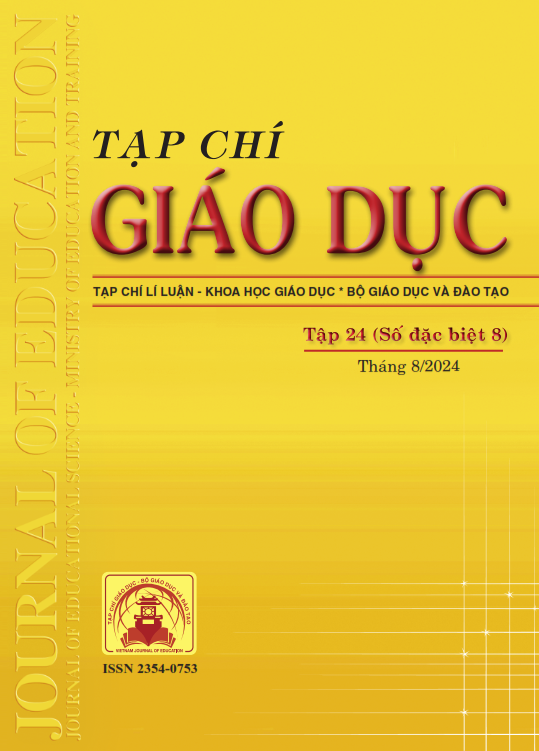Sử dụng AI thiết kế một số dạng học liệu số trong dạy học
Tóm tắt
Artificial Intelligence (AI) is opening up new opportunities in the field of digital learning material design, bringing significant benefits and improving education quality. AI helps create digital documents that are multimedia, interactive and adaptable to the needs of each student, contributing to improving the effectiveness of the teaching and learning process. The article analyzes the applications of AI in the design of digital learning materials in e-learning lectures when teaching, including how to design images, videos, and e-lectures to automate content, personalize user experience, support interface design, and analyze and evaluate effectiveness. At the same time, the article also mentions the challenges when using AI in education and measures to ensure quality, meet educational innovation in teaching in Vietnam.
Tài liệu tham khảo
Bilstrup, K. E. K., Kaspersen, M. H., Assent, I., Enni, S., & Petersen, M. G. (2022, June). From demo to design in teaching machine learning. In Proceedings of the 2022 ACM Conference on Fairness, Accountability, and Transparency (pp. 2168-2178). https://doi.org/10.1145/3531146.3534634
Bộ GD-ĐT (2017). Thông tư số 21/2017/TT-BGDĐT ngày 06/9/2017 quy định ứng dụng công nghệ thông tin trong hoạt động bồi dưỡng, tập huấn qua mạng Internet cho giáo viên, nhân viên và cán bộ quản lí giáo dục.
Bonorden, M., & Papenbrock, J (2022). Evidence-Based Optimization of Classroom Teaching Units Using 3D Printers for Designing Models—From The 2D Picture to The 3D Flower Model. Education Sciences, 12(11). https://doi.org/10.3390/educsci12110831
Bucea-Manea-Țoniş, R., Kuleto, V., Gudei, S. C. D., Lianu, C., Lianu, C., Ilić, M. P., & Păun, D. (2022). Artificial intelligence potential in higher education institutions enhanced learning environment in Romania and Serbia. Sustainability, 14(10), 5842. https://doi.org/10.3390/su14105842
Đặng Thành Hưng (2004). Học liệu và vấn đề phát triển học liệu. Tạp chí Giáo dục, 96, 17-18; 46.
Đặng Thị Thu Thủy (chủ biên), Phạm Văn Nam, Hà Văn Quỳnh, Phan Đông Phương, Vương Thị Phương Hạnh, (2011). Phương tiện dạy học: Một số vấn đề lí luận và thực tiễn. NXB Giáo dục.
Đinh Tiến Việt, Phan Thị Thanh Hội, Nguyễn Tất Thắng (2022). Xây dựng học liệu điện tử trong dạy học chủ đề “Trao đổi chất và chuyển hoá năng lượng ở sinh vật” - Khoa học tự nhiên 7. Tạp chí Giáo dục, 22(số đặc biệt 6), 32-38.
Hidayati, I. N., Dewanti, R., & Rasyid, Y. (2021, September). Integrating ICT Learning Model and the Use of AI to Enhance Students’ Writing Quality. In Proceedings of the 2nd Borobudur International Symposium on Humanities and Social Sciences, BIS-HSS 2020, 18 November 2020, Magelang, Central Java, Indonesia. https://doi.org/10.4108/eai.18-11-2020.2311775
Justitia, A., Werdiningsih, I., Effendy, F., & Taufik, T. (2021). Pelatihan dan Pendampingan Digital Marketing bagi UMKM Jasa Laundry menuju UMKM Go Digital. Jurnal Nasional Pengabdian Masyarakat, 2(2), 60-72. https://doi.org/10.47747/jnpm.v2i2.388
Ninh Thị Hạnh (2019). Thiết kế và sử dụng học liệu điện tử trong dạy học Lịch sử lớp 10 ở trường trung học phổ thông. Luận án tiến sĩ Khoa học giáo dục, Trường Đại học Sư phạm Hà Nội.
Pereira, A., & Piconez, S. (2020, October). Transversal System of Teaching-Learning and Virtual Learning Environment to Teach Artificial Intelligence. In 2020 IEEE Frontiers in Education Conference (FIE) (pp. 1-5). IEEE. https://doi.org/10.1109/FIE44824.2020.9274030
Phạm Trắc Vũ (2006). Cơ sở lí luận và thực tiễn phát triển học liệu trong trường phổ thông. Đề tài nghiên cứu khoa học cấp Bộ, mã số: B2004-80-05.
Rahayu, A., Prasetyo, A. T., & Utomo, C. B. (2023). Pengembangan Komik Digital Berbasis CTL Untuk Pemahaman Konsep IPA dan Motivasi Belajar Siswa Sekolah Dasar. Jurnal Inovasi Pendidikan Dan Pembelajaran Sekolah Dasar, 7(1), 89. https://doi.org/10.24036/jippsd.v7i1.122234
Thủ tướng Chính phủ (2020). Quyết định số 749/QĐ-TTg về việc phê duyệt “Chương trình Chuyển đổi số quốc gia đến năm 2025, định hướng đến năm 2030”.
Trịnh Thị Phương Thảo (2014). Khai thác một số ứng dụng trên điện thoại di động hỗ trợ học sinh lớp 12 trung học phổ thông tự học toán. Luận án tiến sĩ Giáo dục học, Viện Khoa học Giáo dục Việt Nam.
Voulgari, I., Zammit, M., Stouraitis, E., Liapis, A., & Yannakakis, G. (2021). Learn to machine learn: designing a game based approach for teaching machine learning to primary and secondary education students. In Proceedings of the 20th Annual ACM Interaction Design and Children Conference (pp. 593-598). http://doi.org/10.1145/3459990.3465176
Yuliani, S., & Hartanto, D. (2021). Designing Digital Storytelling in English Online Learning. International Journal of Educational Management and Innovation, 2(3), 309-321. https://doi.org/10.12928/ijemi.v2i3.4139
Đã Xuất bản
Cách trích dẫn
Số
Chuyên mục
Giấy phép

Tác phẩm này được cấp phép theo Ghi nhận tác giả của Creative Commons Giấy phép quốc tế 4.0 .












